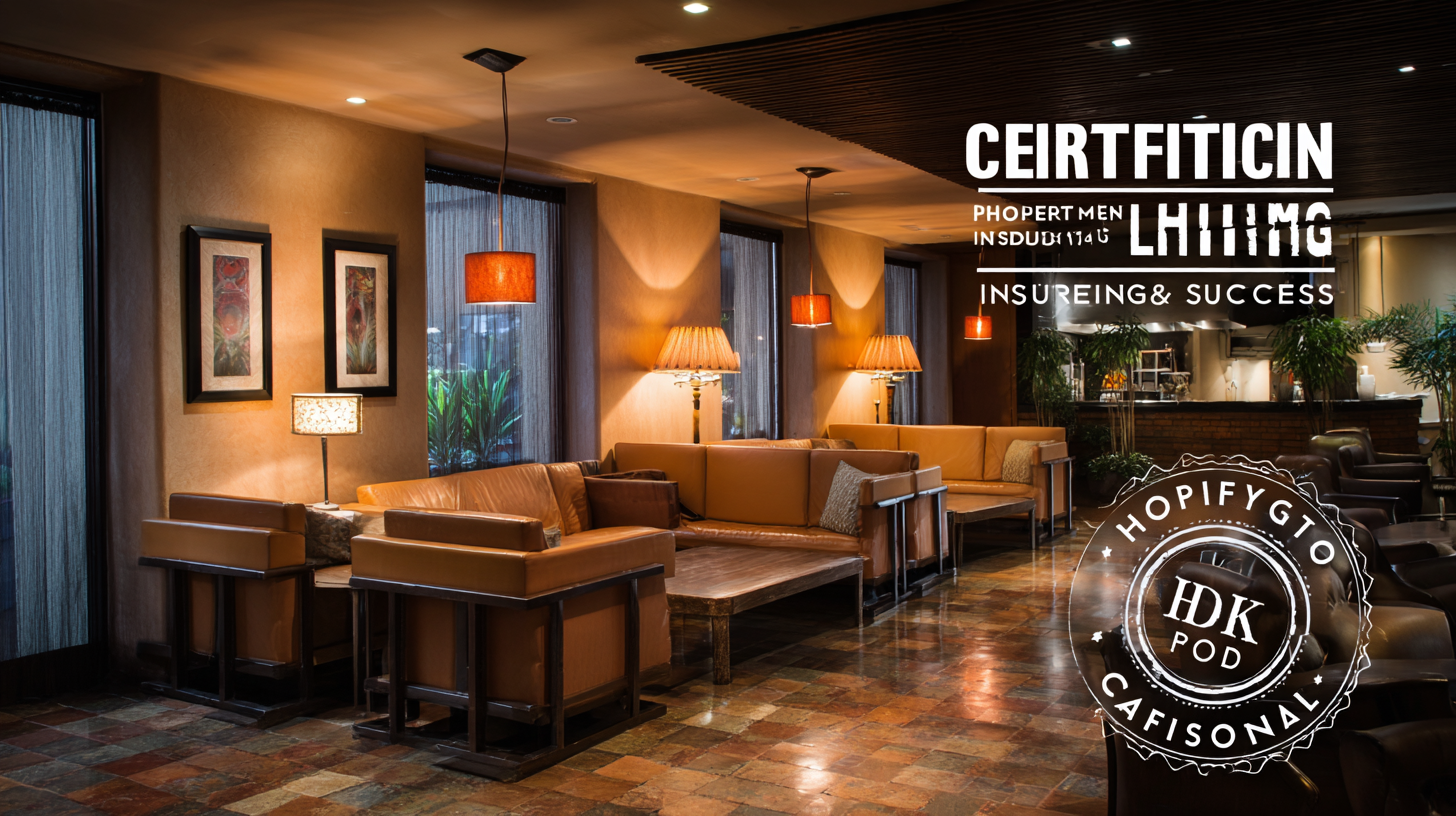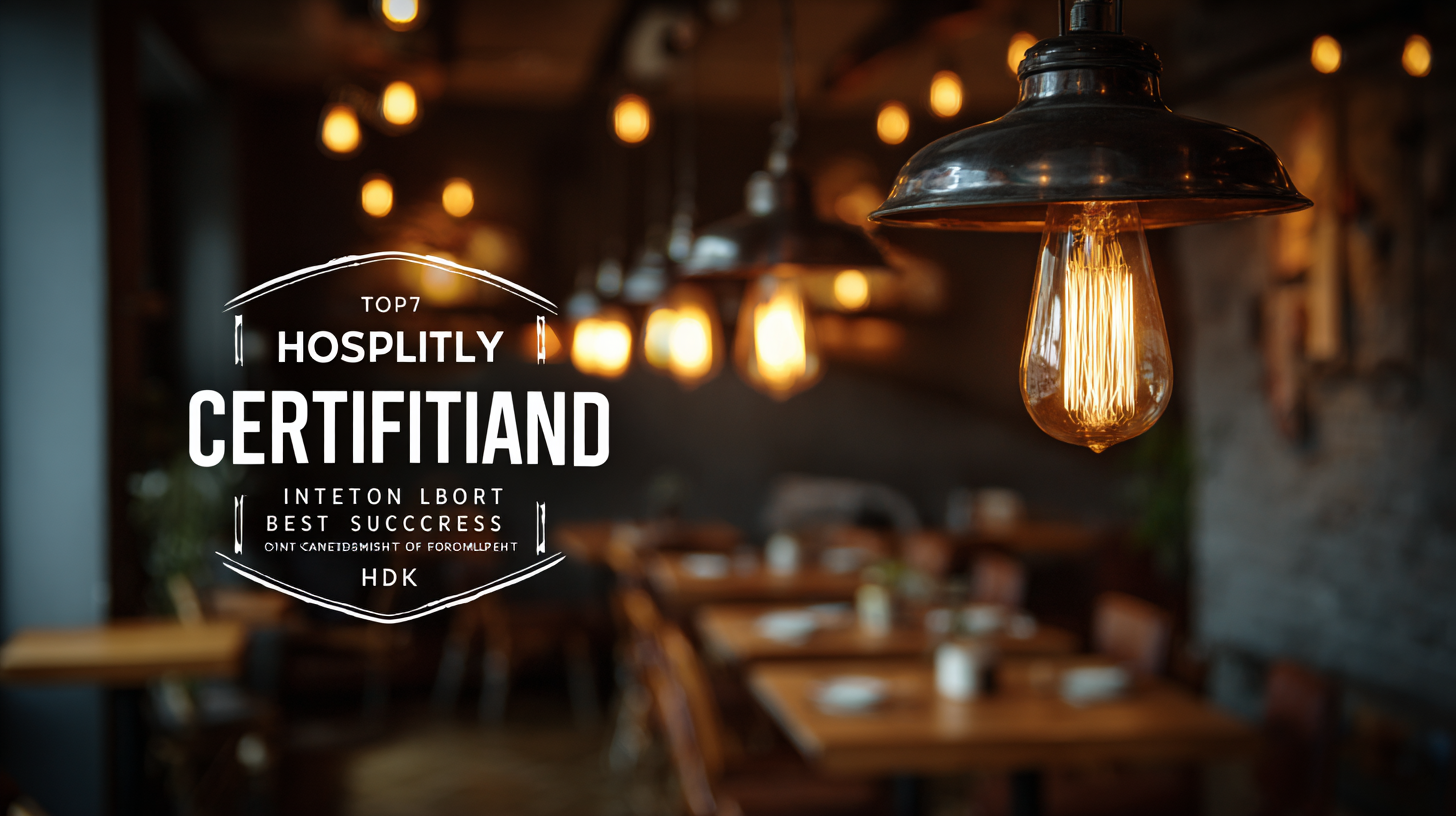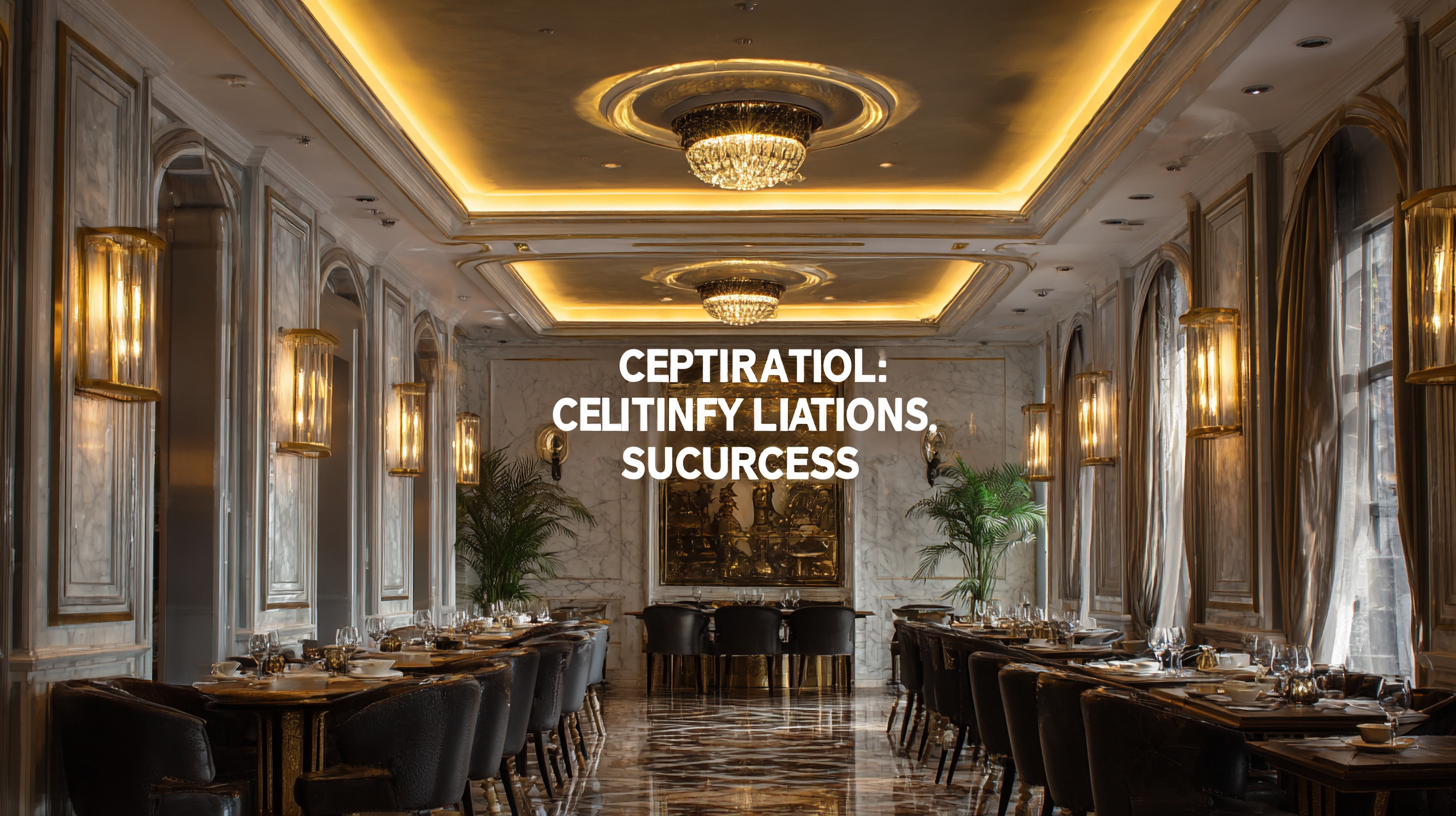Top 20 Best Hospitality Lighting Certifications for Import and Export Success
The hospitality lighting industry is projected to reach a market value of approximately $12.8 billion by 2025, according to recent industry analyses. As businesses in the hospitality sector increasingly prioritize ambiance and functionality, the demand for innovative lighting solutions continues to grow. This surge highlights the vital role of specialized certifications in ensuring that lighting products not only meet aesthetic expectations but also adhere to safety and energy efficiency standards.

Consequently, understanding and obtaining the best hospitality lighting certifications becomes essential for companies involved in the import and export of these products. By navigating the complexities of certification requirements, stakeholders can enhance their market competitiveness and drive sustainable growth in this dynamic industry. In this blog, we will explore the top 20 certifications that can empower businesses in the hospitality lighting sector to achieve success on a global scale.
Top Trends in Hospitality Lighting Certification for 2023
In 2023, the hospitality lighting industry is seeing transformative trends driven by sustainability and technological advancements. According to a recent market report by Grand View Research, the global smart lighting market is projected to reach $102.54 billion by 2026, reflecting a growing emphasis on energy-efficient solutions in hospitality environments. As venues prioritize sustainability, certifications such as LEED and ENERGY STAR are becoming essential for aligning with eco-friendly practices.
Tips for staying ahead in this competitive landscape include integrating IoT-based lighting systems that facilitate better energy management. The rise of green certifications not only enhances a venue's appeal but also contributes to cost savings over time. Additionally, embracing biodynamic lighting—the practice of adjusting light intensity and color temperature to mimic natural light—can significantly improve guest experiences and satisfaction levels.
Furthermore, keeping abreast of emerging technologies like human-centric lighting can set establishments apart. This lighting approach has been linked to improved mood and productivity, particularly in spaces such as hotels and restaurants. Participating in industry seminars and workshops can further enhance your understanding of these innovations while providing valuable networking opportunities with fellow professionals in the field.
Understanding the Importance of Quality Certifications for Export Success
In the competitive world of hospitality lighting, quality certifications play a crucial role in ensuring export success. According to the International Trade Centre, businesses that adhere to recognized quality standards can increase their market access by up to 30%. With the growing emphasis on sustainability and energy efficiency, certifications such as LEED and ENERGY STAR not only validate a product's quality but also appeal to environmentally conscious consumers. Companies without these certifications may face challenges entering international markets, as many countries mandate compliance to specific quality standards for imports.
Moreover, a report published by MarketsandMarkets indicates that the global hospitality lighting market is projected to reach $60 billion by 2025, driven by the rapid expansion of the hospitality sector. This growth underscores the importance of obtaining quality certifications that align with international standards, as they directly influence buyer trust and purchasing decisions. Firms that invest in quality certifications not only enhance their product credibility but also position themselves as leaders in the industry, gaining a significant advantage over competitors who overlook this critical aspect of their export strategy.
Key Certification Programs for Enhancing Global Market Competitiveness
 In today's competitive global market, obtaining the right hospitality lighting certifications can significantly enhance a business's appeal and operational efficiency. These certifications not only validate the quality and safety of products but also demonstrate a commitment to industry standards that resonate with consumers and partners alike. Programs such as the Lighting Certification - National and International (LC-NI) and the International Association of Lighting Designers (IALD) certification are crucial for companies looking to expand their footprint in the import and export sectors. They signify that a business adheres to best practices, ensuring that their lighting products meet the rigorous demands of various international markets.
In today's competitive global market, obtaining the right hospitality lighting certifications can significantly enhance a business's appeal and operational efficiency. These certifications not only validate the quality and safety of products but also demonstrate a commitment to industry standards that resonate with consumers and partners alike. Programs such as the Lighting Certification - National and International (LC-NI) and the International Association of Lighting Designers (IALD) certification are crucial for companies looking to expand their footprint in the import and export sectors. They signify that a business adheres to best practices, ensuring that their lighting products meet the rigorous demands of various international markets.
Moreover, certifications like the Energy Star and the DesignLights Consortium (DLC) help businesses align with sustainability initiatives that are increasingly important to today's eco-conscious consumers. Achieving these credentials not only opens doors to lucrative opportunities but also equips businesses with the knowledge to make informed decisions regarding energy efficiency and innovative lighting solutions. By investing in these key certification programs, hospitality companies can enhance their competitiveness, showcasing their commitment to quality and sustainability in an ever-evolving global marketplace.
Navigating Regulatory Requirements for International Lighting Products
Navigating international markets requires a keen understanding of regulatory requirements for lighting products, particularly in the hospitality sector. Compliance is not just about adhering to local standards; it’s crucial for ensuring safety, achieving quality, and enhancing brand reputation. Different regions have unique regulations regarding energy efficiency, material safety, and electromagnetic compatibility, which can impact the import and export processes significantly.

When considering entering international markets, it’s essential to keep the following tips in mind. First, conduct thorough research on the specific regulations for each country you wish to operate in. Policies can differ greatly, and staying informed will help avoid costly delays in compliance processes. Second, invest in certifications that are recognized internationally. Certifications such as ENERGY STAR, CE Mark, or UL Listing can not only facilitate access to foreign markets but also serve as a mark of quality assurance that appeals to consumers and business partners alike.
Finally, collaborating with experts in international trade can streamline your compliance journey. A knowledgeable partner can offer insights into navigating the complex landscape of tariffs, trade laws, and safety standards, ultimately guiding your company toward successful import and export operations in the hospitality lighting industry.
Strategies for Communicating Quality Standards in the Hospitality Sector
In the hospitality sector, effective communication of quality standards is crucial for ensuring both product excellence and customer satisfaction. According to the International Hospitality Industry Report 2022, nearly 78% of consumers believe that the quality of lighting directly influences their overall experience in hotels and restaurants. This highlights the imperative for hospitality businesses to not only implement high-quality lighting solutions but also to articulate the standards they adhere to, fostering trust and credibility among clients and partners alike.
One effective strategy is the adoption of recognized certifications such as LEED and ISO standards, which serve as benchmarks for quality and sustainability. A study from the Global Lighting Association indicates that establishments holding these certifications can see up to a 25% increase in customer satisfaction ratings. By actively promoting their compliance with these standards through targeted marketing campaigns and transparent communication, hospitality providers can significantly enhance their brand reputation and attract more discerning clientele who prioritize quality and sustainability in their choices.
Top 20 Best Hospitality Lighting Certifications for Import and Export Success
| Certification | Issuing Organization | Relevance to Hospitality | Duration | Cost |
|---|---|---|---|---|
| LEED Green Associate | U.S. Green Building Council | Sustainable Building Practices | 2 Months | $200 |
| LIA (Lighting Industry Association) | Lighting Industry Association | Quality Lighting Solutions | 6 Weeks | $450 |
| Certified Lighting Consultant (CLC) | National Council on Qualifications for the Lighting Professions | Professional Lighting Design | Varies | $350 |
| IES Lighting Fundamentals Certificate | Illuminating Engineering Society | Fundamental Lighting Principles | 4 Weeks | $300 |
| Certified Lighting Designer (CLD) | International Association of Lighting Designers | Advanced Lighting Design Practices | 1 Year | $800 |
